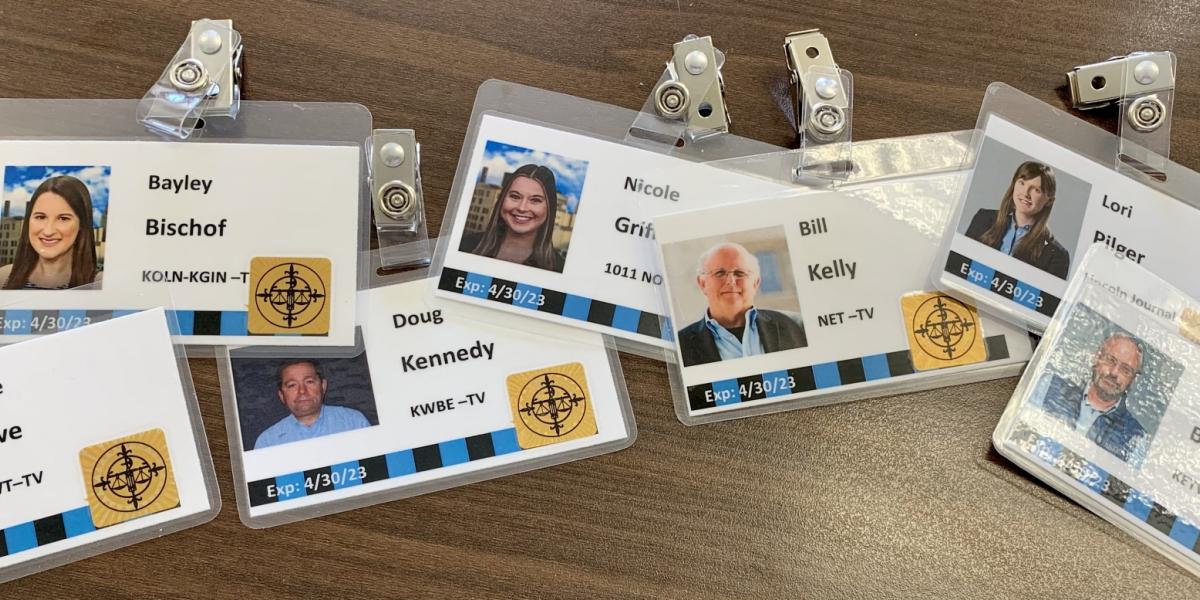Nebraska News Reporter Credentialing Includes Rule and Protocol Review
The 2021 renewal of Nebraska court media credentials includes a multiple-choice review of new and sometimes confusing/problematic rules.
The Supreme Court recently updated the media rules for cameras in the courtroom, requiring court media credentials to be renewed every two years. Taking the opportunity to update news reporters’ knowledge of rules and rule amendments, credentialing has devised a series of questions to be answered before new media badges are issued.
If reporters do not renew their media credentials/court media badge before April 30, 2021, they are removed from the Court’s list posted on the Judicial Branch website. All media credentials will be reissued at the end of April 2021. New badges include a redesign and an expiration date (see photo included with article).
The 400 reporters currently on Nebraska’s credentialed list have been solicited for renewal: https://supremecourt.nebraska.gov/media/credentialed-media
The news article regarding the newly adopted rule amendments can be found online: https://supremecourt.nebraska.gov/newly-adopted-rule-amendments-media-coverage-courts
TEST YOURSELF WITH THE RULE REVIEW:
Multiple Choice Review for Nebraska Expanded Media Rules
(Choose only 1 answer)
#1 – When can jurors be shown on camera or identified in a news story?
- A: Before the trial starts
- B: When they are outside the courtroom
- C: When they read the trial verdict
- D: After the trial has concluded
#2 – When is it necessary to file a new Request for Expanded Media
- A: When the case moves from county to district court
- B: When the case is moved to another judge
- C: When the case is delayed for over 6 months
#3 – Is it OK to take video of an attorney’s notepad or computer screen so long as it for a cutaway?
- A: Yes, as long as a zoom lens is not used
- B: No, notes and screens are often confidential and certainly private
#4 – The rules say not to video or audio record any attorney conferences, how does the Court define attorney conferences?
- A: Conversation between attorneys and their clients
- B: Conversation between co-attorneys
- C: Conversation between attorneys and the judicial officer
- D: Conversation with judicial staff in offices
- E: All of the above
#5 – If you are the pool camera inside the courtroom and want to shoot video of the defendant/parties entering the courtroom, do you need permission of the judge?
- A: Yes, it is part of the trial
- B: No, it is before the judge calls the court to order and out of the bounds of coverage
- C: Depends on the judge, ask the bailiff or judge
#6 – If you have permission to Tweet from the courtroom but are not the still camera pool designee, can you take a quick photo so long as it is only used with the Tweet?
- A: Yes, it is considered part of the request to tweet from the courtroom
- B: No, all photography is run through the pool system
- C: Depends on the judge, ask the bailiff or judge
#7 – Is it permissible to audio record court proceedings as long as it is to double check your notes and you do not publish the recordings anywhere?
- A: Yes for any journalist
- B: Yes, but only if you are a newspaper reporter
- C: Yes, but only if you are with radio
- D: No, it is never appropriate and I governed by the Expanded Media Rules
#8 – Is it all right to record a court procedure without filing paperwork with the Court before the hearing as long as you ask the judge for permission to broadcast the recording afterward?
- A: Yes
- B: No
#9 – How early (prior to trial or hearing) must the camera be set and ready to go in the courtroom?
- A: 30 minutes
- B: 15 minutes
- C: 5 minutes
#10-- Can you take still photos, video, or audio record in the courtroom without reading the Expanded Media rules?
- A: No, the station/paper has signed that I have read and will follow the rules
- B: No, I can have my credentials revoked if I do not follow the rules
- C: Both of the above
#11-- Do you write for a print newspaper or magazine with regular frequency of publication or prepare news to be broadcast on radio or television licensed by the Federal Communications Commission?
- A: Yes. Print news or FCC license
- B: No.

